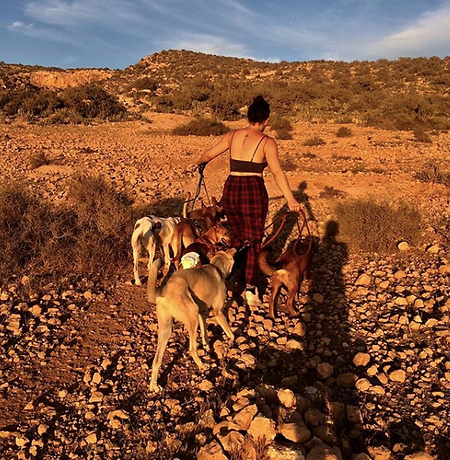
Jess taking some of the rescue dogs for a walk
This inhumane process needs to be put to an end, Morocco Animal Aid is just one welfare NGO fighting back…
In June 2018, I volunteered at MAA - Morocco Animal Aid; a not for profit organisation in the North of Agadir which provides rest, rehabilitation and rehoming to Morocco’s street dogs. Unlike in Western shelters, MAA faces challenges in new dimensions. Every year, hunters inhumanely cull thousands of innocent street dogs - over 400,000 in the last 20 years in response to the ‘dog problem’.
‘The dog problem’ is the most simple way of collectively explaining the mass population growth of unowned, unvaccinated and unsterilised street dogs. Morocco Animal is working alongside other local animal welfare organisations in the community to directly tackle these 3 fundamental welfare issues. As street dogs, the majority also tend to be undernourished, dehydrated and have a plethora of diseases. Others may have also been in fights, hit by cars or faced psychological/physical abuse at the hands of unwelcoming locals in Agadir. MAA is an organisation in place that deals with all of these issues whilst relying 100% on donations.
The story behind MAA begins with the founder, Lucy Austin. She describes the start of MAA being a group of ‘worried individuals’ who simply wanted to help the street dogs that came to their doorsteps in the surfing town of Taghazout. A shared passion and effort amongst a small group of people have since flourished into a successful organisation that now welcomes over 50 volunteers each year. They’ve also upgraded from Lucy’s small 2 bedroom house to a fully functioning shelter with a huge back garden for the rescue dogs to enjoy and a separate house assigned for volunteers.
My time at MAA was truly inspiring, I witnessed both happy and sad endings to dogs' lives, met incredible people and learnt a few DIY skills. However, the main inspiration was that of the Trap Neuter Release scheme(TNR) ran by Association Le Coeur Sur La Platte who have taken in over 700 street dogs to save them from starvation, sickness and slaughter. Although successful, the government were putting more effort behind culling than that of the TNR schemes.
This year I had the opportunity to write a research paper on a topic of choice as part of my university degree. It made sense to write about all I had experienced over the last year volunteering with MAA. I wanted to find a concept that proved how significant investment in the TNR scheme would benefit not only the dogs but also the local residents so that more enthusiasm and investment surrounding the project could really get it going.
I discovered the concept of ‘One Health, One welfare’. It’s a fundamental principle being that if we, as humans, treat animals well, we too will benefit. For Morocco, this means implementing responsible dog ownership, vaccination and sterilisation programmes or at least investing in the community groups which are already in place to deal with such issues.
Government investment in these organisations would not only reduce the numbers of stray dogs on the street, reduce public fear due to religious beliefs, reduce the risk of rabies transmission and infection amongst the dog population and therefore also protect the dogs' welfare. Investment in preventative methods is fully beneficial for Morocco's economy for expenditure on post-exposure prophylaxis (PEP) vaccinations will decrease and like Bali, could save the country around $16 million. Which, as a developing country, would also be highly beneficial in allowing the government to focus on other sustainable development goals.
Currently, the government are not listening to Morocco Animal Aid and the other welfare organisations pleas. As a member of the World Organisation of Animal Health(OIE) you would think Morocco would listen to this advice and take action.
To read the full policy report which focuses on the work of Association Le Coeur Sur La Platte and other local animal welfare organisations - https://drive.google.com/file/d/1gFDjau9-Dpx1GeKtk_QMQb--YzNMRt1D/view?usp=sharing
MAA has partnered up with Ims'One project to build a new shelter/hospital for the forgotten dogs of Agadir. If you have a background in animal rights, conservation, own some land, can donate money, want to volunteer or have any other skill you think may be valuable to Lucy, MAA and her team. You can contact them through their website here http://www.moroccoanimalaid.com/
Jessica Robbins is a third-year International Development student at the School of Politics and International Studies. For the past 3 years, Jess has been involved with dog population control projects in Thailand and Morocco. On a practical basis,she has been assisting and volunteering with TNVR initiatives such as the Morocco Animal Aid. She has an interest in policy and research pertaining to global health and in particular neglected zoonotic diseases. She hopes to further her interests in global health and health governance in a postgraduate study after her undergraduate degree. She enjoys spending time with her rescue dog called Fifi who motivates her to learn more about effective dog population control and the global fight against rabies.
